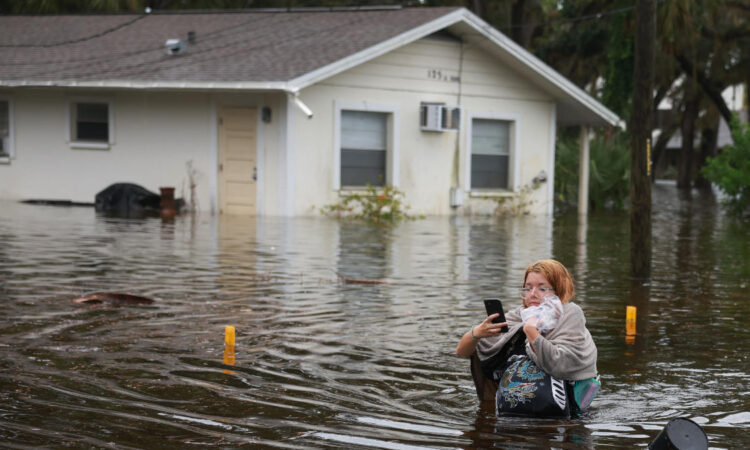
Earlier this year, Chicago native Steve Swanson decided to move full-time to Sanibel Island, Fla., where he had vacationed as a child. A boomerang-shaped barrier island in the Gulf of Mexico, Sanibel was devastated by Hurricane Ian last year, but Swanson did something that would have been unthinkable anywhere in the country a few years ago: He purchased a small house but declined to purchase homeowner’s insurance, which would reimburse him in case of another disaster.
“You self-insure,” Swanson said in an interview with Yahoo News, describing how he adds each month to a rainy-day fund against natural disasters instead of paying a premium to an insurance company. “And then you just hope that it never happens.”
Swanson’s experience is becoming increasingly common. He landed on the frontline of a budding home insurance crisis that has hit coastal and inland states alike. Insurance companies are pulling out of states where evermore frequent natural disasters mean those companies have to pay out large claims after a home is destroyed in a wildfire, leveled by a mudslide or wrecked by a flood,
“I never thought I would see in my lifetime houses that are flat-out uninsurable,” insurance broker Robb Lanham told Axios over the summer.
Recommended reading
‘A global problem’
Research has shown that rising ocean temperatures are causing hurricanes to gain strength more quickly, and to dump more rain than they did in the past. When those hurricanes destroy homes, insurance companies pay for the damage. To cover those expenses, they raise premiums.
Thanks to mounting hurricane losses, home insurance premiums in Florida have risen an astonishing 300% in the last five years, according to the financial news site Benzinga. Residents there now pay an average of $4,200 per year for home insurance, more than double the national average of $1,700, a stark increase that could lead to the reversal of torrid population growth that has made Florida the third-most-populous state in the country.
The soaring rates in Florida reflect how frequently the state is battered by devastating storms. “No other state has reported sustained losses for property insurers like Florida has since its last profitable year in 2016,” Mark Friedlander, spokesman for the insurance lobby group Insurance Information Institute, recently told the New York Times.
Florida is hardly alone. Climate change makes wildfires more likely in states like California. Flooding is also exacerbated by climate change — not only in low-lying coastal states like Louisiana, but also in parts of the Midwest. Kentucky and West Virginia are among the several states particularly vulnerable to landslides.
“It’s a global problem,” insurance expert Lara Mowery recently told the Associated Press.
In all, the United States saw 23 weather-related disasters in 2023 that each caused more than $1 billion of damage.
According to the First Street Foundation, which studies climate risk, 35.6 million homes across the country could see their insurance policies become more expensive, or disappear entirely, as insurers flee high-risk states. “That is crippling. Absolutely crippling,” First Street CEO Matthew Eby told CBS News. “And so those homes are not, from an investment scenario, something that you would invest in.”
Recommended reading
‘A very stark lack of leadership’
Governors from both parties have struggled to help homeowners with rocketing insurance costs, but critics of Florida Gov. Ron DeSantis, who is currently running for the Republican presidential nomination, say he has played politics instead of engaging in sound policy.
Home insurance costs are expected to rise by 40% in Florida in 2023; state governments have some power to limit those hikes, or to make cheaper government insurance available, but they cannot entirely halt or reverse market — or climate — forces. And when those forces descend on homeowners, it is inevitable that chief executives get blamed.
“Ron DeSantis doesn’t believe there’s a climate change crisis,” says Swanson, the recent Sanibel Island transplant. “He is ignoring the problem, by and large. And he’s not really addressing the insurance crisisf either. It is a very stark lack of leadership on his part.”
Some in the insurance industry say that the diminishing number of insurers in Florida is due to the fact that it is too easy to sue insurance companies there. And those lawsuits could be especially damaging to the smaller insurers who now operate in Florida, now that larger companies such as Farmers have bailed on the state.
“This is a man-made crisis,” Insurance Information Institute spokesman Friedlander told CNN in June. “That volume of lawsuits will drive more of these regional companies out of business.”
Earlier this year, DeSantis signed a new law that makes it harder to sue insurance companies, but critics charge that he and the law’s supporters have greatly exaggerated the frequency of frivolous lawsuits. They say the power to take legal action against an insurance company is important for policyholders who do not believe they have been adequately compensated for damage caused to their properties.
Recommended reading
What’s next?
In August, Florida residents of a retirement community in Pembroke Pines staged protests after they saw their home insurance rise. “We have no choice, we have to sell,” one resident said. “As a matter of fact, I just put my house on the market 10 minutes ago.”
Younger prospective homeowners face similar challenges. Many of them are saddled with college debt and a job market geared either toward narrow expertise or service work. To make matters worse, housing has gotten more expensive across the country.
Soaring insurance rates are the proverbial cherry on a homeownership cake nobody wants to take the responsibility for having baked.
“Overall,” Redfin chief economist Daryl Fairweather recently told Yahoo Finance, “the picture looks like it’s going to get harder and harder for people to break into the housing market and buy their first home.”
Recommended reading
